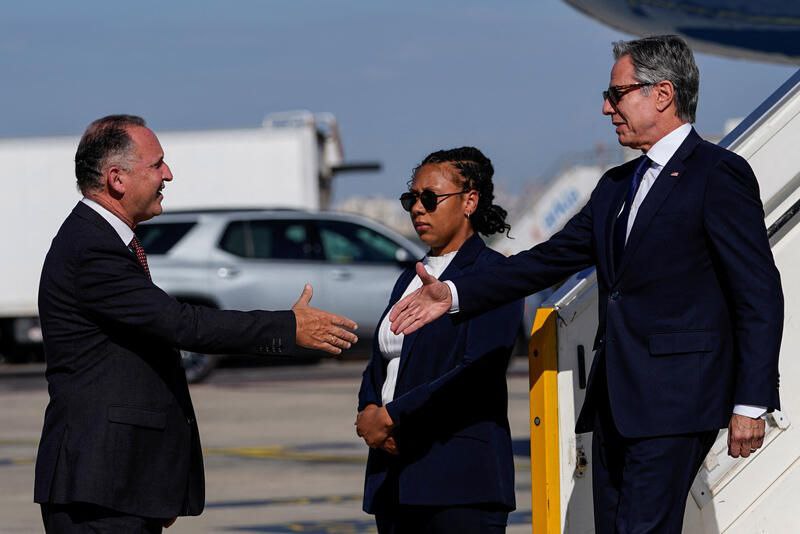Reuters

Secretary of State Antony Blinken landed in Israel on Tuesday in the first big U.S. push for a Middle East ceasefire since Israel killed the leader of Hamas last week – and the last attempt before a presidential election that could upend U.S. policy.
Diplomatic efforts have so far failed to bring an end both to the year-long war in the Palestinian territory Gaza and to its spillover conflict between Israel and the Lebanese armed group Hezbollah.
Washington hopes the death of Hamas leader Yahya Sinwar – Israel’s most wanted man, blamed for triggering the year of warfare by planning the deadly attacks on Oct. 7 last year on Israeli territory – will provide a new opportunity for peace.
But Israel has so far shown no sign of relenting in its military campaigns against both Hamas in Gaza and Hezbollah in Lebanon.
Blinken was due to meet Israeli Prime Minister Benjamin Netanyahu, Defence Minister Yoav Gallant and other officials at the start of a week-long trip that will also take him to Jordan and Qatar.
U.S. officials say he is focusing on plans for rebuilding and governing Gaza after the war, necessary for reaching a ceasefire there. Separately, a U.S. envoy has been in Lebanon, looking at conditions to agree a halt to the Israeli-Hezbollah conflict.
Hours before Blinken landed, air raid sirens sounded in Tel Aviv and other parts of central Israel, after Hezbollah fired missiles at what it said were Israeli military targets near Haifa and Tel Aviv. The missiles were an apparent demonstration that Hezbollah’s capabilities have survived Israel’s biggest onslaught in decades of hostilities.
During a night of heavy strikes on Lebanon’s south and the suburbs of Beirut, Israel struck the area near Beirut’s Rafik Hariri hospital, Lebanon’s main state medical facility. Lebanese authorities said 13 people were killed. The Israeli military said the hospital itself had not been targeted and was not affected.
Blinken has been a regular visitor to the Middle East throughout the conflict – this trip is his 11th since start of the Gaza war – but all previous attempts to reach a ceasefire have failed.
Hamas, which is still holding scores of hostages seized in its Oct. 7, 2023 raid on Israel, refuses to release them without an Israeli pledge to end the war. Israel says it will not halt fighting until Hamas is destroyed once and for all in Gaza, which has been largely reduced to ruins by Israel’s campaign.
The past month has seen a major escalation in Lebanon, where Hezbollah had been firing across the border since the start of the Gaza War. Israel launched a ground assault and a massive air campaign, which has driven 1.2 million Lebanese from their homes and killed nearly the entire top leadership of Hezbollah.
Washington and other allies hope Israel’s killing of Hamas leader Sinwar in a firefight last week could provide a breakthrough, by making it easier for Netanyahu’s government to assert that its objectives have been achieved in Gaza.
But diplomats and other sources say Israel is pressing its military campaign to lock in a strong position before a new U.S. administration takes over following the Nov. 5 election between Vice President Kamala Harris and former President Donald Trump.
ISRAELI RETALIATION AGAINST IRAN
Senior State Department officials said Blinken intends to raise the issue of what happens in Gaza when the war ends, including security, governance and reconstruction. Washington has long said it ideally wants Gaza reunited with the West Bank under a government run by the Palestinian Authority, which now exercises limited self rule in the Israeli occupied West Bank.
Blinken will also discuss Israel’s anticipated retaliation for a ballistic missile attack launched by Iran on Oct. 1, a senior State Department official said, speaking on condition of anonymity.
Allies are worried that Israel’s retaliation could disrupt oil markets and risks igniting a full-blown war between the arch-enemies.
Iran’s Foreign Minister Abbas Araqchi, at a news conference in Kuwait, said Tehran does not seek war and has made efforts to reduce tensions but is prepared for any conflict.
The Gaza war began after Hamas-led fighters attacked Israeli communities on Oct. 7 last year, killing around 1,200 people and capturing more than 250 hostages, according to Israeli tallies.
Israel’s subsequent bombardment of Gaza has killed 42,718 Palestinians, Gaza health authorities say, with another 10,000 uncounted dead thought to lie under the rubble.
The conflict has spread to Lebanon over the past month, with Israel launching a ground campaign and intensified air assault against Hezbollah, which had been firing across the frontier in parallel with the Gaza war in solidarity with the Palestinians.
Israel says it must destroy Hezbollah’s infrastructure to let tens of thousands of Israelis return to homes they fled under Hezbollah fire. Its assault has driven 1.2 million Lebanese from their homes.
U.S. envoy Amos Hochstein held talks with Lebanese officials in Beirut on Monday on conditions for a ceasefire between Israel and Hezbollah. Israel wants firmer conditions than those agreed after its last major war against Hezbollah in 2006, which ended with a U.N. resolution banning armed groups such as Hezbollah from the border area.
Hochstein said neither Hezbollah nor Israel had adequately implemented that U.N. resolution, and it would not be enough for both sides to commit to it. The U.S. was seeking to determine what more needed to be done to make sure it was implemented.
